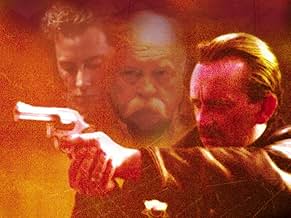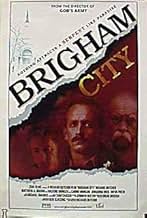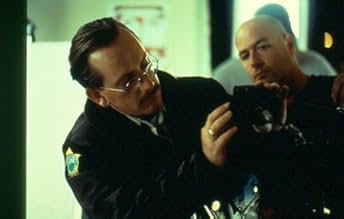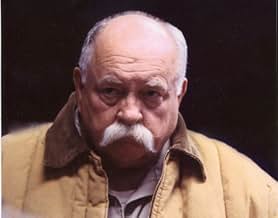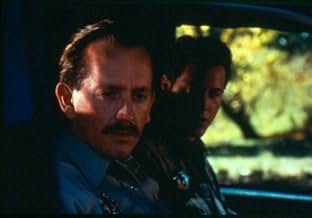CALIFICACIÓN DE IMDb
6.7/10
1.7 k
TU CALIFICACIÓN
The sheriff of a small Utah community searches for a serial killer.The sheriff of a small Utah community searches for a serial killer.The sheriff of a small Utah community searches for a serial killer.
- Dirección
- Guionista
- Elenco
- Premios
- 3 premios ganados en total
Wendy Hoop
- April
- (as Wendy Gardiner)
- Dirección
- Guionista
- Todo el elenco y el equipo
- Producción, taquilla y más en IMDbPro
Opiniones destacadas
It's difficult to watch Richard Dutcher's very capable and entertaining, `Brigham City,' without choking on the intended Mormon zeitgeist that permeates the story. Dutcher goes to considerable length to successfully portray Mormons as loving, decent, church-going friends and neighbors as justification for suspending constitutional rights and imposing a theocracy.
Dutcher plays Wes Clayton, Sheriff of a fictional small town in Utah called Brigham City. Clayton is also the `Bishop' for Mormons in that area, which makes him unquestionably the most influential man in town. A widower who lost his wife and only son in a traffic accident years ago, Clayton is permanently saddened by the loss. Dutcher portrays him with a kindly stoicism, a righteous man who takes both his sacred and secular responsibilities seriously.
When a young woman from California is found murdered in an old barn on the outskirts of town, Clayton calls in the FBI and washes his hands of the investigation, telling his enthusiastic young deputy that this has nothing to do with Brigham City, that it was a random act that could have happened on any number of freeway off ramps. It's something Clayton desperately wants to believe; that Brigham City is a paradise of the faithful and as a result enjoys a divine immunity from the evil `out there' in the world. His duty as both Sheriff and Bishop is to keep it that way. Unfortunately, a second body is discovered, and Clayton is forced to realize that his `Eden' has been invaded by the outside world, and his duty now requires him to get involved.
His ensuing investigation makes your skin crawl. Clayton's methodology is autocratic and fascist. His first suspicion is that the murderer must be an outsider or a `Jack Mormon;' consequently, he and his deputies hang out at the only bar in town, collecting beer bottles and glasses to dust for fingerprints, hoping for a match from the FBI database. When the town's convenience store clerk disappears, Clayton ratchets up the police state, using his authority as Bishop to order church members to go out two by two, as in their missionary days, and search every house in town, lack of a search warrant notwithstanding. When one of them objects by saying he has to be at work, Clayton responds that nothing is more important than the life of the missing girl. When one of the town members rightfully refuses to allow a search of her house, he forces his way in.
Despite deep faith, good intentions, and concern for another human life, fascism in the name of Jesus is still fascism. Clayton's heavy-handedness is precisely why the Bill of Rights exists. While `Brigham City' is a good movie in terms of characterization and story, it is also a very frightening parable about the dangers of religion, and remarkably parallels our nation's attitude and course of action in the aftermath of September 11th. Essentially, `Brigham City' is a microcosm of what the christian right ultimately envisions as America's future, and it's no place where I'd want to live.
Dutcher plays Wes Clayton, Sheriff of a fictional small town in Utah called Brigham City. Clayton is also the `Bishop' for Mormons in that area, which makes him unquestionably the most influential man in town. A widower who lost his wife and only son in a traffic accident years ago, Clayton is permanently saddened by the loss. Dutcher portrays him with a kindly stoicism, a righteous man who takes both his sacred and secular responsibilities seriously.
When a young woman from California is found murdered in an old barn on the outskirts of town, Clayton calls in the FBI and washes his hands of the investigation, telling his enthusiastic young deputy that this has nothing to do with Brigham City, that it was a random act that could have happened on any number of freeway off ramps. It's something Clayton desperately wants to believe; that Brigham City is a paradise of the faithful and as a result enjoys a divine immunity from the evil `out there' in the world. His duty as both Sheriff and Bishop is to keep it that way. Unfortunately, a second body is discovered, and Clayton is forced to realize that his `Eden' has been invaded by the outside world, and his duty now requires him to get involved.
His ensuing investigation makes your skin crawl. Clayton's methodology is autocratic and fascist. His first suspicion is that the murderer must be an outsider or a `Jack Mormon;' consequently, he and his deputies hang out at the only bar in town, collecting beer bottles and glasses to dust for fingerprints, hoping for a match from the FBI database. When the town's convenience store clerk disappears, Clayton ratchets up the police state, using his authority as Bishop to order church members to go out two by two, as in their missionary days, and search every house in town, lack of a search warrant notwithstanding. When one of them objects by saying he has to be at work, Clayton responds that nothing is more important than the life of the missing girl. When one of the town members rightfully refuses to allow a search of her house, he forces his way in.
Despite deep faith, good intentions, and concern for another human life, fascism in the name of Jesus is still fascism. Clayton's heavy-handedness is precisely why the Bill of Rights exists. While `Brigham City' is a good movie in terms of characterization and story, it is also a very frightening parable about the dangers of religion, and remarkably parallels our nation's attitude and course of action in the aftermath of September 11th. Essentially, `Brigham City' is a microcosm of what the christian right ultimately envisions as America's future, and it's no place where I'd want to live.
The worst thing about going to a mystery movie, is to have the perpetrator revealed too quickly. Brigham City is able to keep its secrets well enough that while you are convinced you know who the guilty party is, you don't find out until the last few moments of the film.
The other engaging aspect of the movie is that it also wisely utilizes both the setting (a small Utah town) and the cultural and religious traditions of the mormon church. Mormons are a group that are often denigrated and little understood by most of American Society. Dutcher is able to successfully integrate Mormon traditions of worship and belief into the plot. While some may find this to be too blatant at times, I think he is able to successfully balance his desire to use this as a backdrop for his murder mystery.
As someone who lived in Utah for about two years, I thought Dutcher was very able to capture many aspects of contemporary Rural Utah/Mormon Culture that are quite unique....so if you would like to understand a little more about mormonism, without inviting the Mormon Missionaries into your home, I think this is a great way to do it, while being entertained at the same time, by a great WHODUNIT plot.
The other engaging aspect of the movie is that it also wisely utilizes both the setting (a small Utah town) and the cultural and religious traditions of the mormon church. Mormons are a group that are often denigrated and little understood by most of American Society. Dutcher is able to successfully integrate Mormon traditions of worship and belief into the plot. While some may find this to be too blatant at times, I think he is able to successfully balance his desire to use this as a backdrop for his murder mystery.
As someone who lived in Utah for about two years, I thought Dutcher was very able to capture many aspects of contemporary Rural Utah/Mormon Culture that are quite unique....so if you would like to understand a little more about mormonism, without inviting the Mormon Missionaries into your home, I think this is a great way to do it, while being entertained at the same time, by a great WHODUNIT plot.
I live in Mapleton, UT where it was filmed, and am LDS. I enjoyed the movie. If you don't understand the Church's dogma then the end of the movie may not mean that much to you.
I enjoyed the suspense and liked the acting. You can say what you want about the religon and the politics but it's not much different then other places in the world. If you saw the movie Chocolat, you can see the same thing there.
I enjoyed the suspense and liked the acting. You can say what you want about the religon and the politics but it's not much different then other places in the world. If you saw the movie Chocolat, you can see the same thing there.
It would seem that Brigham City has been largely rejected by its target audience -- the Mormons. This surprised me, as I found myself turning its themes over in my mind for a full week after first seeing it.
Granted, it is nothing if not disturbing -- especially to the Mormon subculture which has been so different from mainstream America for so long that it has come to pride itself on its separateness. Yet I found myself deeply moved by the film. It examines with agonizing realism (and sensitivity) a core fear of those with deep religious beliefs: Will my hope survive when God says no to my prayers and allows the world to come flooding in? Am I only in this for the perks, the protection? Will my faith survive pain that seems completely devoid of meaning?
Yet Brigham City's scope is not confined just to the Mormons or just to the religious -- its broader question is whether it is possible to be truly wise while remaining idealistic and innocent. Because of this, the movie seems especially timely and poignant -- both to an increasingly cynical America haunted by its beautiful-but-elusive potential and to a Mormon culture peering warily out at the rapidly growing, international church with its attendant array of alien dangers and trials.
What effect does encroaching despair and disillusionment have on each individual American, Mormon, idealist of any stripe? How much of your innocence and optimism will you have to part with, even in a victory? It's troubling, and no concrete answers are offered, as this is a question that each believer must ultimately answer for himself. I love this movie's balance of honesty and sensitivity, and I hope that Richard Dutcher will not be discouraged by the less-than-warm reception the LDS audiences have given it. We need more movies like this -- and by "we," I mean everyone.
Granted, it is nothing if not disturbing -- especially to the Mormon subculture which has been so different from mainstream America for so long that it has come to pride itself on its separateness. Yet I found myself deeply moved by the film. It examines with agonizing realism (and sensitivity) a core fear of those with deep religious beliefs: Will my hope survive when God says no to my prayers and allows the world to come flooding in? Am I only in this for the perks, the protection? Will my faith survive pain that seems completely devoid of meaning?
Yet Brigham City's scope is not confined just to the Mormons or just to the religious -- its broader question is whether it is possible to be truly wise while remaining idealistic and innocent. Because of this, the movie seems especially timely and poignant -- both to an increasingly cynical America haunted by its beautiful-but-elusive potential and to a Mormon culture peering warily out at the rapidly growing, international church with its attendant array of alien dangers and trials.
What effect does encroaching despair and disillusionment have on each individual American, Mormon, idealist of any stripe? How much of your innocence and optimism will you have to part with, even in a victory? It's troubling, and no concrete answers are offered, as this is a question that each believer must ultimately answer for himself. I love this movie's balance of honesty and sensitivity, and I hope that Richard Dutcher will not be discouraged by the less-than-warm reception the LDS audiences have given it. We need more movies like this -- and by "we," I mean everyone.
For a gentile like myself, Brigham City is both a good murder mystery about a serial killer and a nice insight into a community where the Mormon culture predominates. The film is the creation of Richard Dutcher who wrote, directed, and starred in it.
Dutcher wears two hats in this film and something you're not likely to see in a gentile setting. He's both the bishop and spiritual leader of the town and the sheriff. Being that must be a unique experience, in most small town the function of the local cops is mainly breaking up bar fights and writing speeding tickets. As one of the tenets of the LDS church is non-imbibing of liquor that is something he might not have to deal with. Still Dutcher and his deputy Matthew Brown do have an influx of other kinds of people in the town engaged in the construction trade. The place is booming.
And so when a serial killer strikes the folks in Brigham City find it inconceivable that the perpetrator could be one of them. Eventually they have to explore the possibility.
When a young girl goes missing, Dutcher deputizes a bunch of people and they do a house to house search which in another setting somebody might complain about a little thing like the Constitution. He does uncover a wrongdoer, but not in the same vein of what he was looking for.
I did like the scenes very much of the everyday life in a Mormon community it gives some great insights. For instance Brown talks about saving money for various things including the mission trip his infant son will eventually make. Not something you would hear in another film.
Dutcher is an imaginative film maker and he's turned out a good one here that can be appreciated outside the state of Utah.
Dutcher wears two hats in this film and something you're not likely to see in a gentile setting. He's both the bishop and spiritual leader of the town and the sheriff. Being that must be a unique experience, in most small town the function of the local cops is mainly breaking up bar fights and writing speeding tickets. As one of the tenets of the LDS church is non-imbibing of liquor that is something he might not have to deal with. Still Dutcher and his deputy Matthew Brown do have an influx of other kinds of people in the town engaged in the construction trade. The place is booming.
And so when a serial killer strikes the folks in Brigham City find it inconceivable that the perpetrator could be one of them. Eventually they have to explore the possibility.
When a young girl goes missing, Dutcher deputizes a bunch of people and they do a house to house search which in another setting somebody might complain about a little thing like the Constitution. He does uncover a wrongdoer, but not in the same vein of what he was looking for.
I did like the scenes very much of the everyday life in a Mormon community it gives some great insights. For instance Brown talks about saving money for various things including the mission trip his infant son will eventually make. Not something you would hear in another film.
Dutcher is an imaginative film maker and he's turned out a good one here that can be appreciated outside the state of Utah.
¿Sabías que…?
- TriviaNone of the actors or crew knew whom the real murderer was prior to the last scene being filmed. The actors and crew filming the scene had to sign a contract saying they would not reveal which one of them played the murderer, until after the movie was officially released.
- ErroresAfter Wes deputizes Stu and gives him a badge, Stu doesn't wear it for the rest of the movie.
- Bandas sonorasBanjo Boy
Written by Ryan Shupe
Performed by Ryan Shupe & the Rubberband
Copyright ©1999 Ryan Shupe (BMI)
Courtesy of Tydal Wave Records
Selecciones populares
Inicia sesión para calificar y agrega a la lista de videos para obtener recomendaciones personalizadas
- How long is Brigham City?Con tecnología de Alexa
Detalles
Taquilla
- Presupuesto
- USD 1,000,000 (estimado)
- Total en EE. UU. y Canadá
- USD 852,206
- Fin de semana de estreno en EE. UU. y Canadá
- USD 103,629
- 8 abr 2001
- Total a nivel mundial
- USD 852,206
- Tiempo de ejecución1 hora 59 minutos
- Color
- Mezcla de sonido
- Relación de aspecto
- 1.85 : 1
Contribuir a esta página
Sugiere una edición o agrega el contenido que falta

Principales brechas de datos
By what name was Brigham City (2001) officially released in India in English?
Responda

